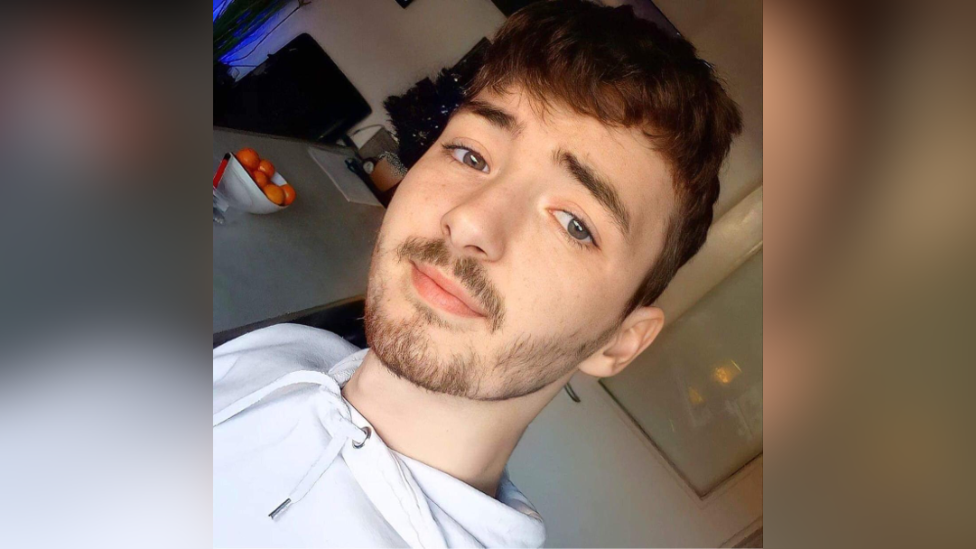Belfast man 'would probably have lived if treated sooner'

Lee Gannon was pronounced dead in the Royal Victoria Hospital in 2022 when he was 25-years-old
- Published
A Belfast man who died after he was wrongly categorised by an ambulance handler would probably have survived if he had been treated more promptly, an inquest has heard.
Lee Gannon died in the Royal Victoria Hospital (RVH) in the city after he became unwell in February 2022. A post mortem found he died from lobar pneumonia - a severe bacterial infection.
The 25-year-old's family called for an ambulance after he had been unwell for several days and began experiencing breathing difficulties at his home in the Beechmount area of west Belfast.
However, the call was not deemed as a Category 1 emergency and Mr Gannon did not reach hospital for almost four hours after the initial 999 call.
Dr Mohamed Al-Aloul, a consultant in respiratory medicine, told coroner Maria Dougan that if Mr Gannon had not been "denied prompt assessment" and treatment, he would have had a strong chance of survival.
According to normal response times, a Category 1 call would have meant Mr Gannon being seen within eight minutes and, in the balance of probabilities, would have led to "a different outcome on the night", Dr Al-Aloul said.
He added that even if Mr Gannon had been responded to as a Category 2 emergency call, it is also likely he would have survived.
However, following the 999 call at 00:19, Mr Gannon did not reach the Royal Victoria Hospital until 04:13.
He died there from cardiac arrest as a result of his severe infection.
Dr Al-Aloul said if Mr Gannon had got to hospital much sooner, his symptoms from a sepsis infection would have been recognised and treated, and he would most likely have survived.
'An error on my part'
On the first day of an inquest into his death, the court was told Mr Gannon had a long-standing addiction to ibuprofen painkillers and was significantly underweight at the time of his death.
However, Dr Al-Aloul said while a low BMI meant a person was more at risk of developing pneumonia in the community and would find it harder to fight infection, there was no indication that this contributed to the cause of death.
Mr Gannon's family, including his mother Anne Gannon and father Colum Wilson, were in court for the hearing.
An ambulance call handler who took the second 999 call from Mrs Gannon said it had been "an error on my part" not to have re-triaged the incident and to escalate it to a Category 1 call.
Emergency medical dispatcher Claire Mercer said Mrs Gannon told her that her son's breathing was short, his eyes were rolling in his head and he was hallucinating.
She told the court she had the discretion to recategorize the call and regretted that she had not.
Ms Mercer said there had been significant pressure on ambulance availability and releasing paramedic crews who were waiting with patients outside hospital emergency departments.
She said there had been training and protocols introduced subsequently about handling such emergency calls. She apologised to the Gannon family on the loss of their son.
In her evidence, Mr Gannon's mother Anne said that during the almost four-hour wait for an ambulance, his condition deteriorated.
She said Mr Gannon's father was told by the emergency call handler to start CPR, which he did for about 30 minutes before paramedics arrived.
"That was their job [the paramedics] - it shouldn't have been his," she said.

Lee's mother Anne Gannon said he was "a beautiful soul" who was loved by everybody
Mrs Gannon said her son was lying limp and unresponsive on the living room floor.
She said she had been baby-sitting her seven-year-old granddaughter that night, and wanted to protect her from seeing what was happening.
Mrs Gannon described her son as "lovable and funny", adding: "He was loved by everybody. He was a beautiful child and a beautiful soul - it's just a pity he was taken away so early."
When asked about the potential for the family taking their son to the RVH themselves, Mrs Gannon said: "There was no way that child could have been moved - that is the whole point of the ambulance service - to save lives, not wreck them."
In an emotional address to the court, Colum Wilson said he wished he could have done more for his son.
"I tried so hard - I just needed help that night," he said.
Mr Wilson said he woke every morning, thought about his son and went to the living room, where his ashes are kept, to say hello to him.
"It's heartbreaking," he said.
The inquest resumes on Tuesday.